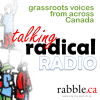
The history of radical HIV/AIDS organizing in Canada
| November 30, 2016Podcast
- trr_rpn_nov28-dec2_2016_aids_activist_history.mp3
Show Notes:
On this week's episode of Talking Radical Radio, Scott Neigh speaks with Alexis Shotwell and Gary Kinsman. They are involved in the AIDS Activist History Project, an initiative that is recovering the stories of the radical organizing that happened in Canada in the 1980s and 1990s in response to the AIDS crisis.
One of today's guests, Gary Kinsman, has written about how we are constantly subjected to systematic social forces that want us to forget the centrality of past struggles by movements and communities to shaping the world of today -- "the social organization of forgetting," he calls it. This constant erasure of collective struggle must be tackled head on with what he calls "the resistance of remembering," a term that points to a range of kinds of efforts to recover that history of struggle, that can in turn feed into our collective efforts to struggle for justice and liberation today.
One movement that did crucial work in decades past but that is largely forgotten now was the collective struggle that resulted when governmental and medical authorities refused to take the actions so urgently needed by those who were infected and at risk in the early years of the AIDS epidemic. To the extent that this struggle is remembered, it is often through the lens of the absolutely crucial work done by the AIDS Coalition To Unleash Power, or ACT UP, in New York City. Yet as crucial as the organizing in New York was, this was a struggle that happened in important ways in cities big and small across North America, including across Canada.
Shotwell and Kinsman are scholars as well as activists who have been involved in queer, anti-capitalist, and other struggles. The idea to do a major research project on histories of AIDS-related organizing in the Canadian context was Shotwell's. She broached the idea with Kinsman, who was himself active in the AIDS movement in that era, and the AIDS Activist History Project was born. In the last few years, they have done oral history interviews with many activists who were involved in the AIDS movement in the 1980s and 1990s in cities across the country, and they have collected important archival documents and other materials as well. Their goal is not to produce the usual sort of output that you might expect from an academic research project -- a definitive scholarly book, for instance -- but rather to use a range of online and in-person approaches to collectively engage in that "resistance of remembering" with people not just within but far beyond the academy.
Shotwell and Kinsman speak with me about the AIDS Activist History Project, about the important work done by the AIDS movement in the Canadian context, and about what we can learn from this important piece of history to inform the many struggles that we face today.
To learn more about the AIDS Activist History Project, click here.
Talking Radical Radio brings you grassroots voices from across Canada. We give you the chance to hear many different people that are facing many different struggles talk about what they do, why they do it, and how they do it, in the belief that such listening is a crucial step in strengthening all of our efforts to change the world. To learn more about the show check out its website here. You can also follow us on FaceBook or Twitter, or contact scottneigh@talkingradical.ca to join our weekly email update list.
Talking Radical Radio is brought to you by Scott Neigh, a writer, media producer, and activist based in Hamilton (formerly Sudbury), Ontario, and the author of two books examining Canadian history through the stories of activists.
Like this podcast? rabble is reader-supported journalism.


Comments
Do
Don't